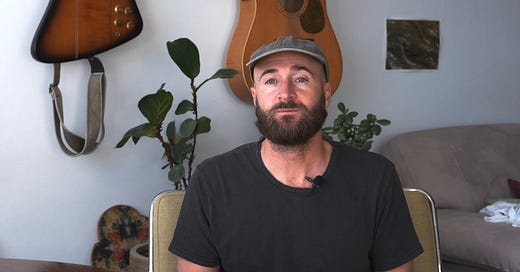Computers are getting faster, Artificial intelligence is taking incredible strides, and I have realised that having one brain is not going to cut it.
So, I’m taking the next necessary step to compete with the incoming robot overlords.
I’m building a second Brain.
The internet is a crazy place
It’s so easy to get distracted, with shorts, tiktok’s, reels, and all the different types of ads in every nook and cranny, at this point it’s fair to say that it’s actually designed to do just that.
I can’t rely on it anymore. My poor puppy-dog style brain uses all of its energy just trying to stay on task. It’s a losing battle. And I know I’m not the only one.
It’s a weird conundrum. Not only can I access the entire sum of the world’s information in a heartbeat, but in doing so, I also run the risk of losing several hours to doom scrolling my life away.
But hey, what about AI! Sure, I love Large language models as much as the next guy, but I’m starting to find it a very vague and vanilla and general way to get information. Great for some things, not great for others.
There’s got to be a better way.
How the heck am I supposed to utilise the information I come across in a reliable way?
I’ve gone through phases of taking notes on the books I read.
But since I’ve started creating and sharing more online, I’ve really come across the limitations of this haphazard system.
Any stat or study I've read, all the stuff I learnt in Uni. Any interesting story I’ve come across. any assignment I've written, any blog post. Most of it is out there.. somewhere.. but it's not easy to find.
And I didn't realise that there would come a time when referencing and utilising this information, would actually be beneficial and useful for me.
I think what that requires, is an attitude shift.
Research as a leisure activity.
I came across the idea from a blogger on Substack, named Celine Nguyen.
When we are at school and uni, we often have to research for a specific purpose. Usually an assignment or essay that has a looming due date. There is pressure, it’s often on a topic that we most likely wouldn’t be engaging with if we didn’t have to, and we have to do it to achieve some kind of outcome that is assessed. And when we’re finished, we often forget what we’ve learned.
It’s an intense environment.
But reading and learning, I’ve come to realise, is largely a leisure pursuit. And it often helps us in places we couldn’t have foreseen when we were doing the reading.
Some of the pillars of this philosophy are:
Research begins with a desire to ask and answer questions.
It requires understanding the history, theory, and practices of the discipline(s) you work within.
Research as leisure activity is directed by passions and instincts.
And finally, the Research culminates in some output, thereby contributing to the greater sum of human knowledge and culture.
Utilsing this philosophy also requires a system of Personal Knowledge Management (or PKM) which brings us to…
How to build a second brain.
I take my ques here from the king of Personal Knowledge Management (PKM) Tiago Forte. Who basically wrote the book on Building a second brain. Well, he actually did.
Tiago says, We often consume information at the wrong time, not when we actually need it.
Did you know: The average person consumes 34 gigabytes of information daily, equivalent to 174 newspapers. Which is Five time higher than in 1986.
To make use of valuable information, we need to package it and send it to our future selves.
So, When I first started learning about Building a second brain, It felt the same as when I was a 14 years old nerd in maths class, and I learned that compounding interest is the most powerful force in the world. I understood it. I believed it. I just wish I had put that knowledge into place then and there.
I'm getting the same vibe from this idea. And I’m not making the same mistake this time.
Building a Second Brain is about optimising an external system to overcome personal limitations. David Allen, the literal king of Getting things Done says, "Your mind is for having ideas, not holding them."
An external note taking system can be as simple as Apple notes, or Google Keep, or as complex and multi featured as Evernote, Obsidian or Notion (or my favourite, Capacities).
The Superpowers of a Second Brain
There are four essential capabilities that we can rely on a Second Brain to perform for us: Making our ideas concrete. Revealing new associations between ideas. Incubating our ideas over time. And Sharpening our unique perspectives.
Basically it comes down to this approach when consuming information.
The CODE Framework
Capture: Save what resonates. Consider if it's inspiring, useful, personal, or surprising
Organize: Use a recommended system, like Para, or design your own to prime your mind for action.
Distill: Highlight key points for easy rediscovery. "Touch" each note to make it more discoverable
Express: Shift from consuming to creating. "Information becomes knowledge only when we put it to use."
Tiago notes that this little system helps us avoid "heavy lifting" – which is basically demanding instant results from our brains at the times when we need them to recall information, because we’ve got that info nicely saved in a central location (free of distractions).
In school, notes are disposable and regurgitated for tests.
In the professional world, notes are for taking action and continuous reference. You are expected to take action on your notes, not just regurgitate them.
One last point, by youtuber Sam Mafia – just make sure these apps and this process doesn’t become a form of sophisticated procrastination, A second brain is not a replacement for your actual brain, make sure you're still thinking.
Conclusion
In conclusion, the internet is crazy, our brains can’t cope with the amount of info that’s thrust upon us. If we shift our school-based attitude to researching, and take a more leisurely stance with the help of a note-taking system and a note-taking app or two, we can build our knowledge wealth by compounding it over time.
Peace.







Share this post